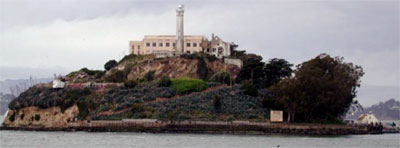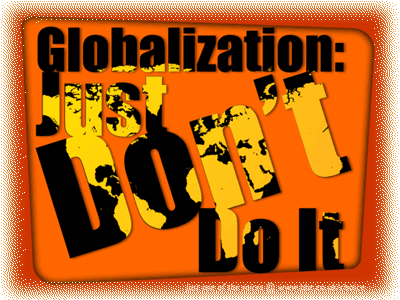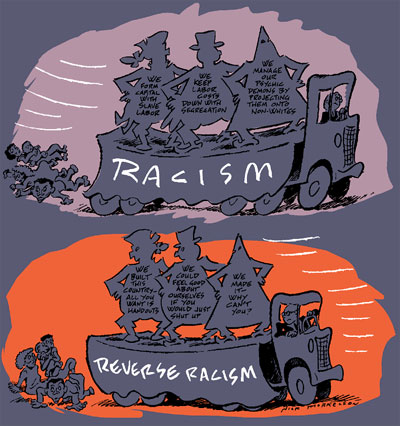MONTREAL SERAI EDITORIAL
We could just start over but it's oh so hard to do When
you're lost in a masquerade (George Benson, This Masquerade)
"Social democracy is the new right. It has taken on the
historic task of taming neo-liberalism in a spirit of vacuous opportunism. It
is at war with Serbia today and may be fighting its own suburbs tomorrow. All
in the name of realism, not rocking the boat, above all not disturbing the status
quo", wrote Ignacio Ramonet in Le Monde Diplomatique (Social Democracy
Betrayed) in April 1999.
 Many
in the various movements against corporate globalization frame their campaigns
in the language of attacks and constraints on ‘democracy’ by corporate
power. Alternative visions commonly put forward by NGOs implicitly accept existing
social democratic models as the only possible way forward. In framing the problem
in this way, they glorify and legitimize fundamentally unjust systems of government.
Many
in the various movements against corporate globalization frame their campaigns
in the language of attacks and constraints on ‘democracy’ by corporate
power. Alternative visions commonly put forward by NGOs implicitly accept existing
social democratic models as the only possible way forward. In framing the problem
in this way, they glorify and legitimize fundamentally unjust systems of government.
So many people are absorbed in confronting transnational corporations
and concentrating on the minutiae of WTO agreements, IMF and World Bank policies.
But we must also work to deconstruct, delegitimize and dismantle the nature
of this ‘democracy’ and the systems of political and economic controls
it maintains. If we agree that political parties are little more than changeable
masks on the face of corporate power, why do many of us still direct so much
energy towards them?
In the face of unbridled imperialism and war -- emanating from
the very governments which proclaim themselves to be bastions of democracy --
many of the demands made by NGOs, trade unions and other organizations about
corporate globalization sound little more than pleas for more state power.
More interventionist economic policies, more regulation, with
some nice words like ‘accountability,’ ‘participatory,’
‘environmentally sustainable’ and ‘people-centered’
thrown in for good measure.
There is a correlation between the ‘radical’ and
‘reformist’ elements of the ‘anti-globalization movement’
and their respective faith -- and investment -- in what purports to be democracy
in the countries in which they are situated. Some argue that the political system
is basically good but nasty corporations came along and hijacked it, bought
off some politicians and it all got bad.
 Our
mission is supposed to be to save the system and affirm the freedoms and values
we all supposedly shared and enjoyed before big business ruled the roost. Meanwhile
we are expected to believe that those at the top can and will make real change
if we concentrate our time and energies into performing like porpoises, jumping
up and down enough to keep them in line.
Our
mission is supposed to be to save the system and affirm the freedoms and values
we all supposedly shared and enjoyed before big business ruled the roost. Meanwhile
we are expected to believe that those at the top can and will make real change
if we concentrate our time and energies into performing like porpoises, jumping
up and down enough to keep them in line.
Adherence to this notion of democracy for which we are told
to daily give thanks greatly constrains the parameters of thought and action
for change. It is a cage. If we don't like it, we can vote every few years to
change the color of paint on the bars. Those who organize outside of electoral
politics are told to get real, be ‘constructive’ and engage with
the process if we really want to make it better. But who is it that needs to
get real, exactly?
What masquerades as ‘social democracy’ has nothing
to do with the politics of liberation and everything to do with social control.
Indeed, in many places the current systems of government are founded on colonization,
occupation, and the suppression of Indigenous Peoples' rights to self-determination.
These governments' continued existence, power and privileged place in the world
rest on their access to natural resources through colonization of the lands
that they occupy and their involvement in imperial exploits of the past and
present in other parts of the planet.
Analyzing the impact of colonization and Indigenous Peoples'
rights to self-determination, Maori lawyer Moana Jackson writes:
"Monotonous but persistent arguments that the English
Westminster system or the French republican models were the only valid and civilized
ways in which people could exercise self determination interacted with the belief
that real law was only the product of a European mind. Complex theories about
where sovereignty resided in a society, and the Victorian notion that primitive
peoples could not possess it because of their ignorant nature, were colonizing
myths developed to ensure that colonizers could legitimate their dispossession
of Indigenous Peoples." That's democracy, folks.
Once one accepts the legitimacy of the system of ‘democracy’
in countries like New Zealand, Australia or Canada, one also accepts the legitimacy
of conquest, of dispossession and of the imposition of colonial rule. Not to
mention, capitalism.
Our strategies and alternatives to the neo-liberal agenda must
reflect an unequivocal opposition to colonialism and imperialism in all its
forms. Locally and globally.
Outrageously, ‘democratic’ Western governments
continue to pontificate about ‘democracy’ to the rest of the world,
which in their view must go hand in hand with a wholehearted embrace of the
free market.
New York Times columnist Nicholas Kristof begins his ridiculous
apology for Musharraf's rule in Pakistan (What Is Democracy Anyway? May 3 2002)
with:
"If there were a form of government that produced autocrats
who sponsored terrorism, stole millions of dollars while impoverishing their
citizens, shredded public education and health, permitted child bondage, tortured
dissidents and tolerated pogroms against minorities, then we would all condemn
it. Except in South Asia such a system is called democracy."
Silly me, until I got to the last sentence I could have sworn
Kristof was writing about the USA!
There is a direct link between the foundations of colonizer
settler states and their global imperialist exploits. Some years ago, in his
book Struggle For The Land, Cherokee scholar and activist Ward Churchill
noted that the USA:
"now possesses the capacity to extend essentially the
same sort of relationships it has already imposed upon American Indians to the
remainder of the world. And, given the experience it has acquired in Indian
Affairs over the years, it is undoubtedly capable of garbing this process of
planetary subordination in a legalistic attire symbolizing its deep-seated concern
with international freedom and dignity, the sovereignty of other nations, and
the human rights of all peoples."
 In
countries like the USA, Canada, Australia and New Zealand, Indigenous Peoples
conveniently become "minority interests" as genocide and invasion
has reduced them to numerical minorities within their own territories. Hysterical
cries of ‘reverse racism’ and ‘tyranny of the minority’
are heard -- including from some on the ‘left’ -- whenever there
are real or perceived challenges to the status quo from Indigenous Peoples.
In
countries like the USA, Canada, Australia and New Zealand, Indigenous Peoples
conveniently become "minority interests" as genocide and invasion
has reduced them to numerical minorities within their own territories. Hysterical
cries of ‘reverse racism’ and ‘tyranny of the minority’
are heard -- including from some on the ‘left’ -- whenever there
are real or perceived challenges to the status quo from Indigenous Peoples.
Now I am watching the lead up to New Zealand's July 27 general
election, reflecting on the resources, energy, and hopes being sucked into electoral
politics. I wonder about the enormous differences that could be made if these
were channeled into building extra-parliamentary communities of resistance which
were prepared to contest the very foundations of this ‘democracy’
we live in.
A decade or so ago, enormous energy went into changing the
electoral system to one of mixed member proportional representation. Such reform
did not address in any way the fundamental fact that the institutions of ‘democracy’
are built on the denial of Maori rights to self-determination. Nor has it arrested
the free market fundamentalism which has underpinned successive New Zealand
governments' policies for so long.
With a pro-war, Blairite Labor government in power here at
the moment, this is the time when various people, trade unions, and community
organizations make it clear that we cannot dare be too critical of this neo-liberal
‘center-left’ party for fear of helping the neo-liberal ‘right-right’
party win the election.
James Petras argues: "The "street and not the ballot
box is the road toward creating authentic forms of democratic representation
against the corrupt, impotent and complicit political institutions." (Right/left
polarization: The ballot box and the street, Rebellion, 10 May 2002).
By contrast with many of the social democratic NGO-dominated
movements on corporate globalization, many of the popular mobilizations on these
issues sweeping the world have little time for electoral politics, putting forward
radical critiques of the systems of government operating in their country. We
can see this in the neighborhood popular assemblies of Argentina, and the slogan
"Que se vayan todos" (All politicians should go!).
It was also there in June's No One is Illegal march in Ottawa
during the G8 Summit which linked the ‘war on terror’ with the continued,
systematic policies of genocide and dispossession in North America, racist immigration
policies and other manifestations of imperialism at home and abroad.
When communities are badgered into making submissions, attending
‘consultations’ or lobbying MPs they are being corralled into a
system in which they have no real power, and into participating in a meaningless
charade, the parameters of which have already been determined. For some, the
illusion of being heard and the thrill of rubbing shoulders with bigwigs is
far more important than real change.
Naturally, the pressure groups and organizations which value
lobbying political parties more than community education and resistance get
better resources and perks. There are rewards for taking part in this masquerade.
But free finger food, cocktails, warm fuzzies and a chance to namedrop don't
add up to much when weighed against the stamp of popular legitimacy that governments
derive from such encounters.
In colonial settler-states like New Zealand, Canada, Australia,
the USA, we have the choice of Tweedledum and Tweedledumber. Vote for Chris
Columbus or Ferdie Magellan. We can vote for any party we like, so long as they
are capitalist colonizers. If that's democracy, is it worth fighting for?
THE END
Voice Your Opinion
- Return to
the Table of Contents - HOME
 Many
in the various movements against corporate globalization frame their campaigns
in the language of attacks and constraints on ‘democracy’ by corporate
power. Alternative visions commonly put forward by NGOs implicitly accept existing
social democratic models as the only possible way forward. In framing the problem
in this way, they glorify and legitimize fundamentally unjust systems of government.
Many
in the various movements against corporate globalization frame their campaigns
in the language of attacks and constraints on ‘democracy’ by corporate
power. Alternative visions commonly put forward by NGOs implicitly accept existing
social democratic models as the only possible way forward. In framing the problem
in this way, they glorify and legitimize fundamentally unjust systems of government. Our
mission is supposed to be to save the system and affirm the freedoms and values
we all supposedly shared and enjoyed before big business ruled the roost. Meanwhile
we are expected to believe that those at the top can and will make real change
if we concentrate our time and energies into performing like porpoises, jumping
up and down enough to keep them in line.
Our
mission is supposed to be to save the system and affirm the freedoms and values
we all supposedly shared and enjoyed before big business ruled the roost. Meanwhile
we are expected to believe that those at the top can and will make real change
if we concentrate our time and energies into performing like porpoises, jumping
up and down enough to keep them in line. In
countries like the USA, Canada, Australia and New Zealand, Indigenous Peoples
conveniently become "minority interests" as genocide and invasion
has reduced them to numerical minorities within their own territories. Hysterical
cries of ‘reverse racism’ and ‘tyranny of the minority’
are heard -- including from some on the ‘left’ -- whenever there
are real or perceived challenges to the status quo from Indigenous Peoples.
In
countries like the USA, Canada, Australia and New Zealand, Indigenous Peoples
conveniently become "minority interests" as genocide and invasion
has reduced them to numerical minorities within their own territories. Hysterical
cries of ‘reverse racism’ and ‘tyranny of the minority’
are heard -- including from some on the ‘left’ -- whenever there
are real or perceived challenges to the status quo from Indigenous Peoples.